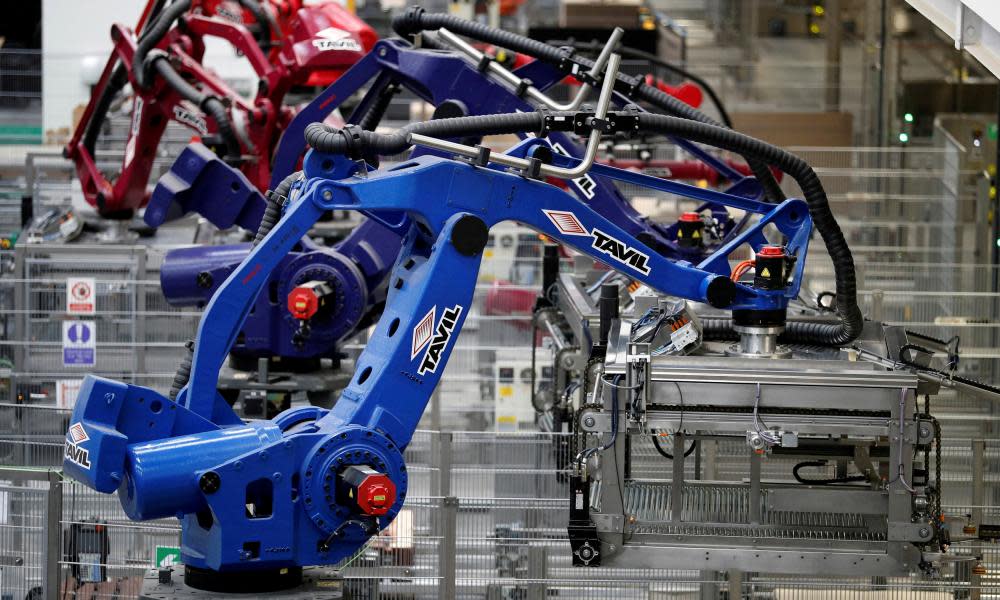The Guardian view on productivity: the robots are coming | Editorial

A country’s ability to improve its standard of living over time depends almost entirely on its ability to raise its output per worker. That’s why Nobel laureate Paul Krugman concluded that productivity isn’t everything – but in the long run it is almost everything. Instead of wasting the nation’s time focusing on the non-existent threat of the deficit, the chancellor, Philip Hammond, this week conceded the “everything” that Mr Krugman had identified: British productivity has stalled and as a result workers’ real wages will be lower than when the recession began. Before the crash, we would have expected living standards to double every 40 years. Now that will take 80. That means lost decades for millions of ordinary people.
It’s easy to become overly pessimistic. The epoch of enormous economic progress that characterised the 20th century is not over; we are suffering from seven years of government failure where ministers thought their job was to watch the economy and suffer passively from capitalism’s inevitable cycles. Rather than take a view of the economy and by fiscal action seek to secure prosperity for all, ministers embarked on a highly ideological agenda of dismantling the state and the protections afforded to workers – arguing erroneously that these were holding back the state. Mr Hammond has been forced to alter course because his party’s reckless policies had jeopardised the long-term improvement in the national standard of life.
Britain’s problem is that its most productive regions are also the most unequal. Workers in London and many towns in the south-east produce more each hour than those in hyper-productive Germany. However, those cities recorded the highest levels of inequality. Who in their right mind would think it would be a good idea to spread around the country a model built on baristas and barristers? What all politicians agree on is that to raise productivity Britain will need to embrace technological advance. After big leaps in artificial intelligence, as our magazine cover story charts, robots have finally reached a maturity that allows mass deployment. Online supermarket Ocado has almost entirely automated a warehouse that fulfils 40% of customers’ orders. A fifth of Amazon’s 480,000 workers are robots. Ever since Elizabeth I denied a patent for a knitting machine over concerns it would create unemployment, political leaders have worried about job-killing machines.
History, however, shows this to be overdone. Since the Industrial Revolution, real GDP per capita in western Europe has increased 15-fold. Over the same period hours declined by about a half. Workers did lose their jobs, but more were created. Recently this process has been driving up inequality as computers have substituted for bookkeepers, cashiers and telephone operators. This has super-sized the wealth of those who own technology. This concentrating effect is deepened by smarter machines. Today’s wave of automation is different in the sense it is “intelligent”. Such cleverness alters the effect on labour. Consider the introduction of driverless vehicles, which Mr Hammond said would mean a million people who drive for a living having to find new jobs. A car and a driver have to be combined to work as a taxi. A driver with two taxis creates no extra output. A faster car or a satnav doesn’t change much. But if a passenger can ride in a driverless car, then the owners of taxi firms will invest in technology rather than drivers. A few winner-take-all entrepreneurs ought not to be able to monopolise all the profits of technology while workers’ wages stagnate. There’s a good case for a universal basic income for humans, if vassal robots take all the jobs.
There is also a wider philosophical problem. Smart software learns while collecting data, refining its recommendations as it goes along. However, algorithms can struggle to spell out exactly how they have come to a decision. This brings us closer to a vision depicted in Isaac Asimov’s I, Robot, where the machines planning the economy start to make small errors in their calculations. When tackled about the discrepancies they have no answer. Asimov thought humans will have so ceded their autonomy that “only the machines know and they are going there and taking us with them”. This cannot be our future. Robots and their software must remain in the service of humans, able to be switched off. Their ability to reason and to appear sentient needs regulating. Humans possess a creativity still denied to machines. In chasing higher economic output we should not lose sight of the value of our humanity.

 Yahoo News
Yahoo News 
